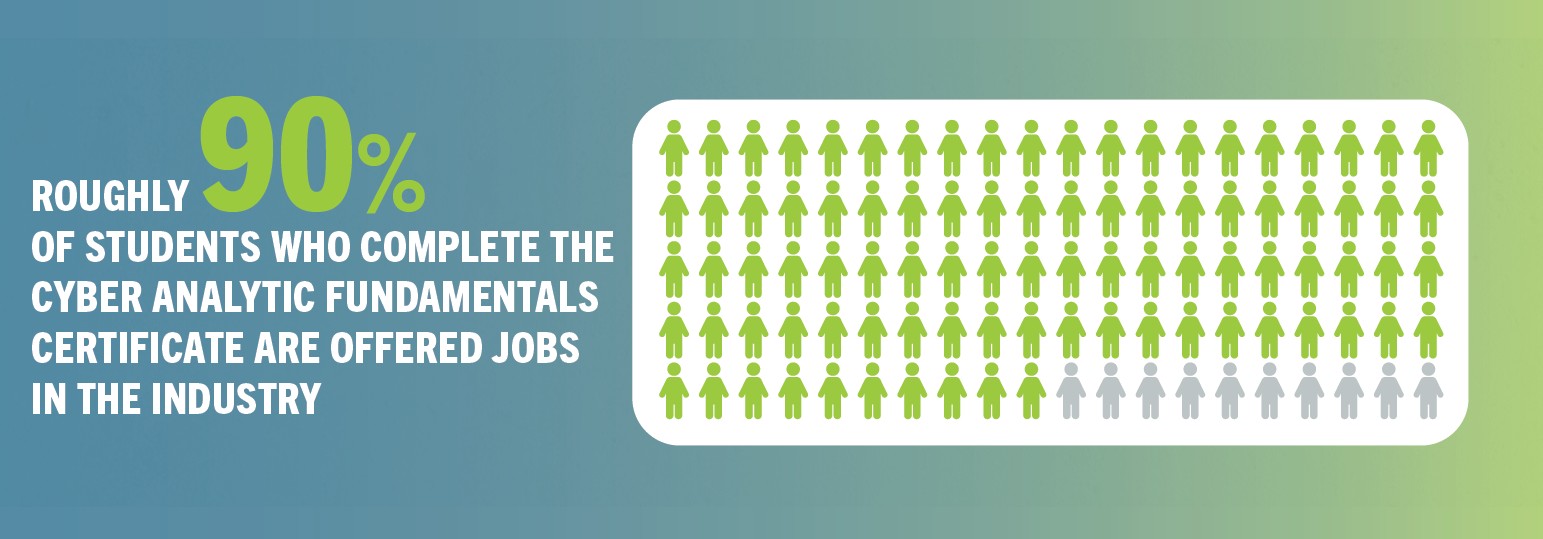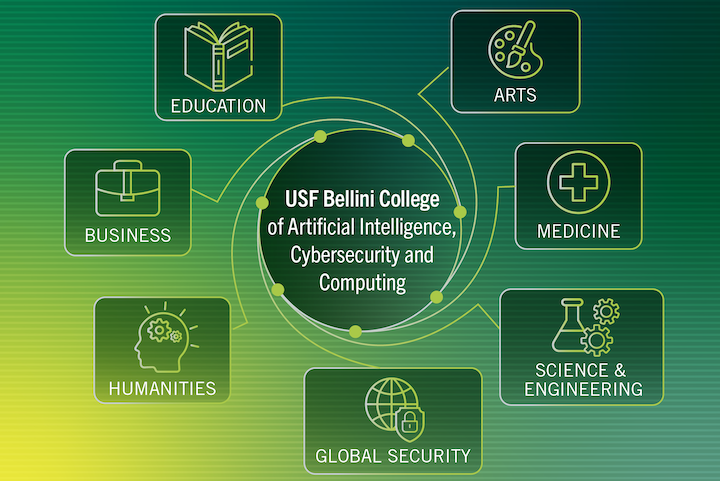The University of South Florida’s Bellini College of Artificial Intelligence, Cybersecurity
and Computing went from concept to reality at a speed more familiar in the business
world than higher education.
Plans for its launch were announced in March 2024 -- only months after USF Provost
and Executive Vice President Prasant Mohapatra first proposed the idea to leadership
– and it will open this fall.
Named for Tampa tech pioneer Arnie Bellini and his wife, Lauren, whose $40 million
gift is the largest in USF history, it's the first college in Florida and among the
first in the nation focusing on artificial intelligence and cybersecurity.
Lauren and I are committed to ensuring Tampa doesn’t just keep up with the AI revolution — we lead it. This college is just the beginning. The future of cybersecurity, AI, and digital defense will be built right here in Cyber Bay.
Arnie Bellini
A Region and a University on the Rise
Sudeep Sarkar arrived in Tampa in 1993 as a newly graduated doctoral student and freshly
hired assistant professor at the University of South Florida. “It was basically a
tourist town,” Sarkar recalled of the city, whose metro population was 1.8 million
at the time. “We had Busch Gardens. We could see the roller coaster.”
Three decades later, the region is home to more than 3 million residents and a thriving
tech industry that has received an influx of talent and capital over the past several
years, leading Forbes to name it the “No. 1 Emerging Tech City in the U.S.” in 2022.
The publication went on to suggest Tampa, home to more than 25 percent of Florida’s
tech jobs, could become the next Silicon Valley, where the industry benefits from
a flow of research and highly qualified job candidates emerging from Stanford, UC-Berkeley,
UC-Davis, UC-Santa Cruz and other partner institutions.
It’s no accident that as the region’s profile within the space soared, USF was on
the cusp of a series of milestones that would deliver even more momentum toward that
growth.
Membership in the Association of American Universities in June 2023 placed the university
among North America’s top academic institutions, and a sharp rise in external research
funding over the following two years will lead to even greater impacts, mostly in
areas supporting Tampa’s tech boom.
USF already was home to CyberFlorida, established by the state legislature in 2014
to help position Florida as a national leader in cybersecurity through education,
research and outreach.
It had existing research ties to Tampa-based MacDill Air Force Base, U.S. Central Command and U.S. Special Operations Command, along with industry partnerships with prominent regional employers like Tampa General Hospital, Raymond James, ConnectWise, ReliaQuest, Rapid7, Sylint, Abacode, KnowBe4 and others.

A Vision Realized
As the growth of artificial intelligence and the introduction of generative AI rapidly
emerged, President Rhea Law recognized the need for USF to be on the leading edge
of providing related research and learning opportunities.
Law went to members of the university’s leadership council for their input on an idea
to create programs focused on AI, cybersecurity and other fast-evolving fields. The
changes would align with USF’s strategic priorities, with a goal of positioning the
Tampa Bay region and the state of Florida as a national leader.
"From the outset, the vision was to establish an innovative hub for excellence that
would inspire our students, faculty and staff to think boldly about the future, expand
collaborative efforts and tackle pressing challenges in new and exciting ways,” Law
said. “We understood that as AI and cybersecurity evolved, their impact would be felt
across all disciplines, and the demand for skilled professionals in these areas would
continue to grow.”
Prasant Mohapatra was named provost and executive on January 23, 2023. Close to 10
months after his arrival in Tampa, he suggested a standalone college to ensure AI
and cybersecurity considerations would become part of almost every college discipline.
Mohapatra didn’t offer a detailed blueprint. Instead, he shared a vision and a promise
to launch the college while sparing existing budgets.
“People were excited, but the concern was where the resources were going to come from,”
said Sarkar, who agreed to serve as interim dean to establish the college. “And also,
that we could do this in a way that would have no negative impact on any student.”
The solution: new funding, and a promise to do no harm that would encompass USF’s
broad approach to the idea.
“The biggest reaction was, ‘Irrespective of how good the idea is, how is this going
to impact me and my slice of the pie?’” Mohapatra recalled. “So, we said, ‘Not a penny
from your existing resources will be diverted to this.’ And we delivered on that thanks
to our legislature and our governor’s increased investments in USF and our board of
trustees’ prioritization of this critical issue. Once that was ironed out, everyone
was on board.”
We understood that as AI and cybersecurity evolved, their impact would be felt across
all disciplines, and the demand for skilled professionals in these areas would continue
to grow. Rhea Law
USF President
The Importance of Strengthening Relationships
USF's leaders incorporated input from strategic partners on designing curriculum,
creating opportunities for experiential learning for students and integrating professional
development modules into the classroom.
Through an existing partnership with ReliaQuest, a global cybersecurity technology
company based in Tampa, the Muma College of Business offers students from any major
the opportunity to earn a certificate in cyber analytic fundamentals and a LinkedIn
badge through a lab-based program that exposes them to real-world tools and technology.
Roughly 90% of students who complete the program are offered jobs in the industry, many with ReliaQuest, which approaches the four-week course as an opportunity to both train and recruit talent.
Other industry partnerships led USF to require secure coding and introduced robotics
process automation in certain majors, a forward-thinking approach that will continue
in the new college.
“This is part of our DNA,” Sarkar said. “We understand that our students need to be
exposed to the latest tools in the industry before they graduate.”

Reimagining Programs through an AI Lens
In the future, the Bellini College will add majors combining AI with music, design,
medicine, psychology, criminology, business and other areas, along with an artificial
intelligence minor.
The college promises to help unify faculty work in AI and cybersecurity, addressing
some of the fragmentation that now hinders the ability to secure large research projects.
USF was awarded a record $738 million in research funding during fiscal year 2024.
Mohapatra expects the new college to quickly emerge as the university’s second highest
in terms of external research funding, behind health and medicine sciences.
“I believe it will increase USF's research capacity exponentially,” said Dr. Yael
Bensoussan, a USF Health physician whose landmark project, Voice as a Biomarker of
Health, uses AI to help doctors diagnose and treat diseases such as cancer and depression
based on the sound of a patient’s voice. “The scientific world is realizing that true
impactful research and implementation of science comes from collaboration between
data scientists and computer engineers and experts' fields of implementation such
as medicine, biology, music and sports.”
The relationship between AI, cybersecurity, and computing reflects a rapidly evolving landscape where traditional departmental boundaries are increasingly blurred. These fields are deeply interconnected, and the structure of the Bellini College provides an environment that emphasizes collaboration where advancements in one area often propel developments in others.

Future-Proofing Students
Unchecked artificial intelligence poses a threat as it becomes ingrained in everyday
life, serving as a potential weapon capable of perpetuating biases and eroding privacy.
Addressing that threat requires a workforce with a bedrock foundation in ethics to
shape AI design, implementation and oversight. A report from the task force that helped
guide the new college's creation notes that it will “establish USF as a vanguard in
this critical mission.”
Sarkar said a commitment to providing students in as many disciplines as possible
with skills to navigate AI-driven challenges helped guide many of the task force’s
most important decisions.
“Things will evolve, and the technology will change,” Sarkar said. “But we have an
obligation to future-proof our students by providing them with the tools they will
use to handle those changes. That’s the philosophy we go by.”